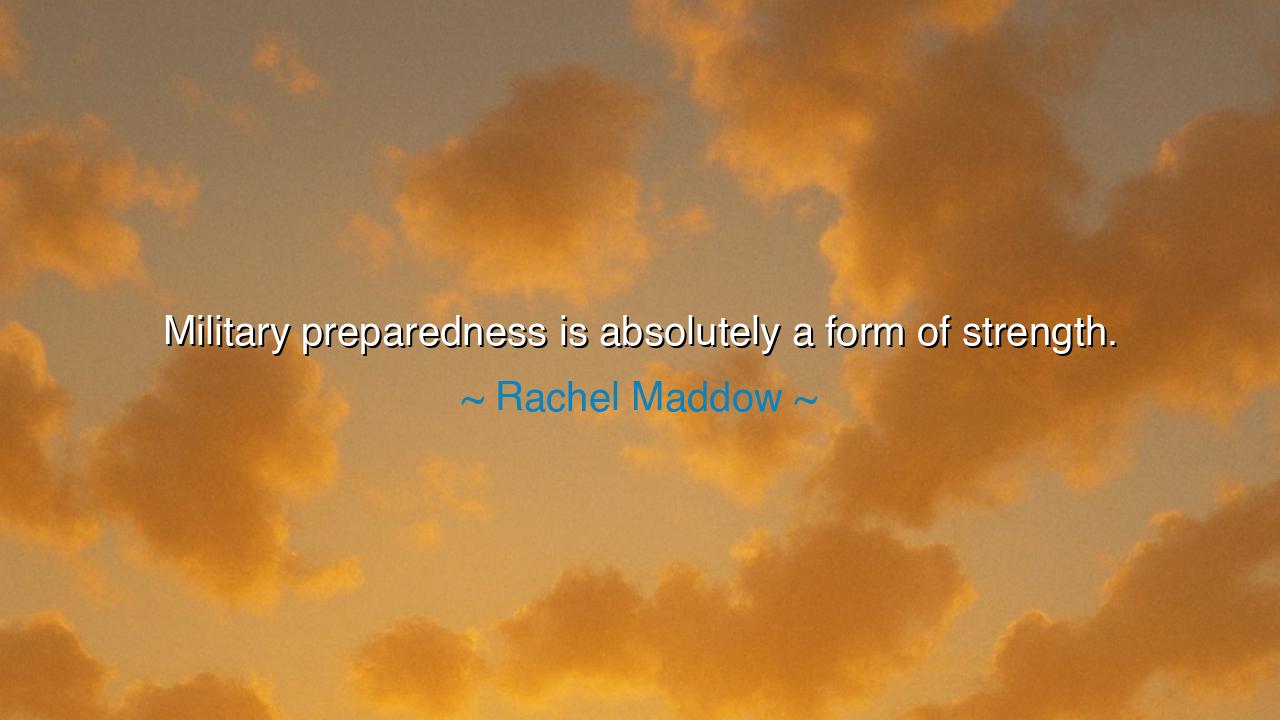
Military preparedness is absolutely a form of strength.






Hear the voice of Rachel Maddow, who in contemplating the power of nations declared: “Military preparedness is absolutely a form of strength.” These words may appear plain to the eye, but they resound like the tolling of iron bells. For she points to an ancient truth known to empires and tribes alike—that readiness for conflict is itself a shield, and that those who stand prepared often deter war more surely than those who cry for peace but stand defenseless.
When Maddow speaks of military preparedness, she speaks not of aggression, not of bloodlust, but of vigilance. To be prepared is to keep the sword sharp and the walls mended, not so that they may be used with recklessness, but so that enemies may think twice before striking. A people who neglect their defenses invite danger, but a people whose watch is constant and whose forces are disciplined carry an aura of power that often prevents battle before it begins. Strength, then, is not only in fighting but in being ready.
History is full of proofs of this wisdom. Recall the Athenians before the Persian invasion. It was their preparedness—the fleet built in the years before Xerxes advanced—that saved Greece. Without those triremes at Salamis, the Persians might have crushed the Greek spirit forever. The ships did not come into being on the day of crisis; they were the fruit of foresight, sacrifice, and preparation. Thus, when trial came, Athens did not crumble, for their strength was already laid in store.
So too in the twentieth century, when Britain stood alone against the rising tide of Nazi power. The readiness of the Royal Air Force, forged in the crucible of training and foresight, became the shield of the nation in the Battle of Britain. Had Britain neglected its preparedness, the skies would have fallen, and with them the hope of Europe. But because they had cultivated vigilance, their strength shone forth, and their island endured against overwhelming odds.
Maddow’s words, though spoken in the halls of modern discourse, carry the same resonance as these examples of old: preparedness is not wasted energy, but an investment in survival. To be prepared is to declare to both friend and foe that one is not helpless, that one’s destiny will not be shaped by the will of others. It is a form of strength because it anchors courage with capability, turning intention into action and resolve into reality.
The lesson for us is clear: never confuse peace with complacency. Peace is the prize, yes, but preparedness is its guardian. A family that keeps nothing aside for hard times may be broken by sudden need. A community that ignores its defenses may fall to the first test. A soul that neglects its inner watchfulness may collapse at the whisper of temptation. To be prepared—whether in war, in work, or in spirit—is to walk clothed in strength, ready for the day of trial.
Practical actions are these: in life, prepare for storms even in days of calm. Train your skills, guard your resources, and discipline your body and mind. In your nation, honor the necessity of defense, even if your heart longs for peace, for peace is preserved only by those who stand ready. And in your spirit, cultivate readiness through prayer, reflection, and resolve, so that when hardship comes, you do not break. Preparedness, in every form, is not fear—it is wisdom.
Thus let Maddow’s words be carved into memory: “Military preparedness is absolutely a form of strength.” For the shield that is ready need not be raised, and the sword that is sharp may remain sheathed, because their mere presence preserves peace. Let us learn from this eternal principle: that readiness, born of vigilance and discipline, is itself the silent triumph of strength.






AAdministratorAdministrator
Welcome, honored guests. Please leave a comment, we will respond soon